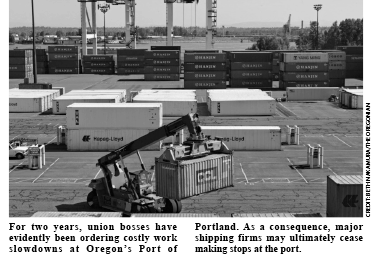Is This Any Way to Run a City’s Schools?
Leaked CTU Proposals Won’t Do Anything to Improve Schools’ Poor Performance
Forced-Unionism Federal Labor Policy Foments Workplace Warfare
(Click here to download the July 2014 National Right to Work Committee Newsletter)
Right to Work supporters across America have long understood that monopolistic unionism as promoted by the National Labor Relations Act (NLRA) and other federal statutes undercuts employee productivity.
 But in the nearly 80 years that the pro-forced unionism NLRA has been on the books, few observers have described the harmful impact of Big Labor-instigated class warfare in the workplace as vividly as National Labor Relations Board (NLRB) Administrative Law Judge Jeffrey Wedekind recently did.
But in the nearly 80 years that the pro-forced unionism NLRA has been on the books, few observers have described the harmful impact of Big Labor-instigated class warfare in the workplace as vividly as National Labor Relations Board (NLRB) Administrative Law Judge Jeffrey Wedekind recently did.
In an 18-page decision issued in late May, the San Francisco judge supplied extraordinarily detailed evidence of how two years ago bosses of the International Longshore Workers Union Local 8 and the ILWU itself commenced ordering illegal employee slowdowns at the Port of Portland in Oregon.
As Mr. Wedekind’s opinion explained, longshore union chiefs’ motive for allegedly instigating the illegal slowdowns was to protest the assignment of work that involves the plugging, unplugging, and monitoring of refrigerated containers after they are unloaded from vessels to electricians employed by the port.
In order to punish ICTSI Oregon, Inc., the company that operates Terminal 6, the opinion continued, for the assignment of dockside “reefer” work to electricians, ILWU kingpins allegedly began “directing intermittent slowdowns and work stoppages . . . in early June 2012.”
According to the judge, ample contemporary evidence indicates longshoremen have indeed “deliberately worked in a less productive manner.”
Local, International Union Bigwigs ‘Directed’ Illegal Slowdowns, Evidence Indicates
They have operated their cranes “at a reduced speed,” refused to “hoist their cranes in ‘bypass mode’ to discharge high containers,” refused to “move two 20-foot containers . . . at a time on older trailers,” and driven their trucks “slowly” while taking “long routes around the yard.”
As a consequence of the recurrent slowdowns, major shipping firms may ultimately cease making stops at the Port of Portland.
Even as all these productivity-quashing and illegal job actions were allegedly occurring, ILWU union bosses were under a court injunction not to instigate “slowdowns or work stoppages” at Terminal 6.
This may well explain why Mr. Wedekind was unable to find evidence of “explicit threats” by union officials to foment slowdowns since the injunction was issued.
Nevertheless, he found “compelling circumstantial evidence” that illegal coordinated job actions were “directed or coordinated by Local 8 and the ILWU as well.”
For example, the judge cited the finding of economist Bryce Ward, who had been hired by ICTSI to analyze terminal productivity, that the “productivity of every crane and nearly every crane operator remained depressed” throughout the entire period of investigation — a “‘remarkable coincidence.’”
“Judge Wedekind should be commended for his careful weighing of the evidence, and for warning ILWU bosses that they could face contempt sanctions if the apparent sabotage continues,” said National Right to Work Committee Vice President Greg Mourad.
“Unfortunately, it is not clear that the judge’s stern words will be any more effective in deterring illegal job actions at the Port of Portland than previous judicial opinions finding that the ILWU hierarchy has crossed the line seem to have been.”
Federal Law Organizes Employees ‘Into Fighting Groups’
“Although punishing ICTSI over a job assignment decision it doesn’t even control and intentionally slowing down work at the Portland Port are both technically illegal,” Mr. Mourad continued, “federal labor law as a whole looks kindly on union bosses who resort to militant tactics.
“As the late jurist and legal scholar Robert Bork wrote back in the 1960’s, the NLRA favors the ‘organization of employees into fighting groups.’
“And more than any other provisions, the NLRA provisions empowering Big Labor to foist ‘exclusive’ union representation on all employees, including union nonmembers as well as members, in a government-delineated ‘bargaining unit’ promote strife in the American workplace.
“The judicial process, even in the able hands of a legal professional like Jeffrey Wedekind, is ill-equipped to handle the abuses the NLRA fosters. The genuine solution is to reform the NLRA itself by removing its pro-union monopoly provisions.”

Leaked CTU Proposals Won’t Do Anything to Improve Schools’ Poor Performance

Wherever Big Labor wields the power to collect forced union dues, union bosses funnel a large share of the confiscated money into efforts to elect and reelect business-bashing politicians. Employment growth tends to lag as a consequence.

Members Insist They Keep Pro-Right to Work Campaign Promises